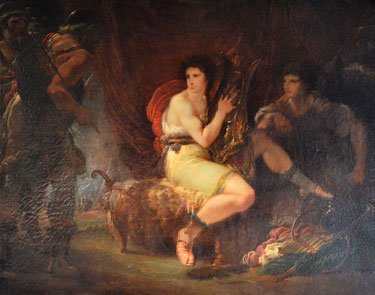Demigods and Men
Homer, Iliad, Inequality, Seth Bernardete

Giuseppe Cades, Achilles in his Tent with Patroclus, Playing a Lyre, surprised by Ulysses and Nestor, 1782, Louvre Museum.
Seth Benardete, “Achilles and the Iliad†quoted by Belacqui.
Achilles in the ninth book is found “pleasing his heart with the clear-toned lyre and singing the famous deeds of men†(klea andrÅn); wheres Aeneas, before disclaiming his genealogy to Achilles, remarks that “we know each other’s lineage and have heard the famous words of mortal human beings†(prokluta epea thnÄ“tÅn anthrÅpÅn). Deeds are done by andres, words are spoken by anthrÅpoi; and if human beings do anything, it is only the tillage of the fields. The heroes’ contempt for speeches is but part of their contempt for anthrÅpoi, and yet they depend on them for the immortality of their fame. AnthrÅpoi are the descendants of andres, the shadows, as it were, that the heroes cast into the future, where these poor copies of themselves live on; and as the adulation they will give would seem to justify their own existence, it is proper that these later generations, extolling the heroes beyond their worth, should look on them as demigods: so the word hÄ“mitheoi occurs but once, in a passage on the future destruction of the Achaeans’ wall, and not accidentally it is coupled there with andres (hÄ“mitheÅn genos andrÅn).



